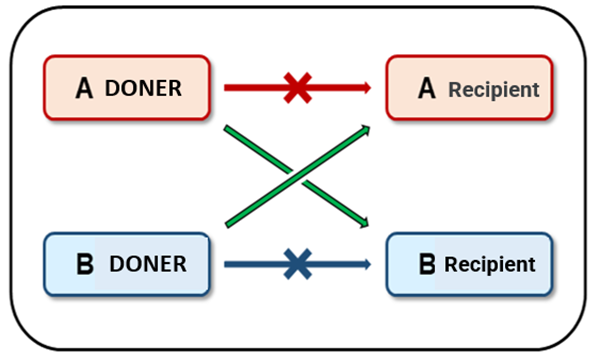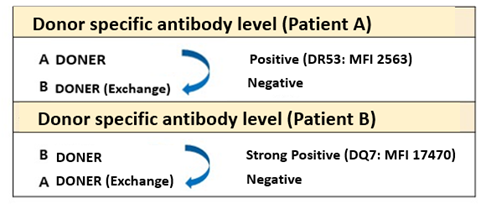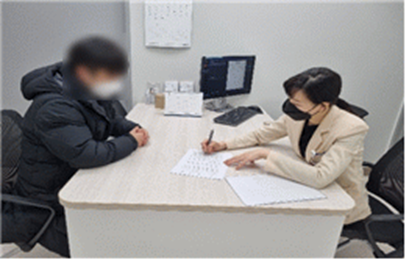Kidney transplantation, which was difficult even with desensitisation treatment, was successful with a donor exchange transplant.
Kidney transplantation, which was difficult even with desensitisation treatment, was successful with a donor exchange transplant.
At Seoul National University Hospital, two pairs of transplant patients who underwent kidney exchange transplantation showed smooth kidney function.

[Image 1] Schematic diagram of kidney exchange transplant
If kidney transplantation is difficult due to differences in blood type or transplant suitability, desensitisation treatment is performed to remove antibodies in the blood to enable transplantation. It was recently reported that two patients who had difficulty receiving kidney transplants due to transplant incompatibility despite several rounds of desensitisation treatment successfully received kidney transplants through donor exchange transplantation and have been staying healthy without any problems for one year.
On July 17, the Organ Transplant Centre at Seoul National University Hospital confirmed that two pairs of transplant patients and their families who underwent kidney donor exchange transplantation in January of last year are currently experiencing smooth kidney function. The team was led by professors Ha Jong-Won, Min Sang-il, Jeong Chang-Wook, Yuk Hyeong-Dong, Lee Ha-Jeong, and Kim Yong-Cheol.
The 'Kidney donor exchange transplant,' which was introduced in Korea in 1991, is used when there is a high risk of transplant failure, such as when the blood type and compatibility of the selected organ donor and recipient differ, or when a lymphocyte cross-test results in a positive result. This transplant approach combines data on patients waiting for transplants registered at medical institutions to identify patients and families with a high possibility of success and executes an exchange transplant. However, while the prospect of kidney transplantation for immunocompetent patients grew with the discovery of immunosuppressants and the introduction of desensitisation treatment*, exchange transplantation did not take hold in Korea.
*Desensitisation treatment: Treatment that reduces the amount of rejection antibodies in the body and eliminates antibody-producing cells to overcome sensitization and blood type mismatch.
In this situation, a successful donor exchange transplant case occurred at Seoul National University Hospital last year. Two patients whose immune incompatibility was difficult to resolve despite initial desensitisation treatment are living new lives through successful donor exchange transplantation.
Patient A had previously received two kidney transplants from his mother and younger brother but was preparing for a spouse donor transplant as he needed a third re-transplantation. However, despite repeated desensitisation treatments, the possibility of transplantation was uncertain due to persistent positive cross-reactivity test results and high antibody levels.
Patient B, as another case, had received a kidney transplant from his younger brother 18 years ago but was preparing for a re-transplantation from a spouse donor due to the recurrence of the existing disease. However, patient B, who needed repeated desensitisation treatment because his blood type was incompatible with that of the donor and his antibody level was high, had a very difficult time complaining of symptoms of lower blood pressure and blurred vision during desensitisation treatment.
New hope arose in a situation where difficult treatments were repeated and kidney re-transplantation was uncertain. The medical staff at Seoul National University Hospital’s Organ Transplant Center suggested ‘donor exchange transplantation’ to two patients who were scheduled for surgery on the same day. Patient A received a kidney transplant from Patient B's donor, and Patient B received a kidney transplant from Patient A's donor.
Previously, both patients tested positive for anti-HLA antibody assay, making transplantation difficult. The intensity of HLA antibodies is classified based on the MFI (Mean Fluorescence Index) value. The higher this value, the stronger the intensity and the poorer the prognosis after transplantation.

[Image 2] Changes in antibody levels through donor exchange

[Photo] Organ transplant coordinator explaining the donor exchange transplant process.
However, as all antibodies came back negative in the exchange transplant cross-reactivity test, the two patients were able to proceed with donor exchange transplantation and received a successful kidney transplant. The medical staff reported that both patients recovered smoothly after simultaneous exchange transplantation and the transplanted kidneys are still maintaining good health more than a year later.
This was the best possible outcome because of the excellent situational judgment of medical personnel such as nurses and coordinators, including Professor Ha Jong-won's team at the Organ Transplant Center at Seoul National University Hospital, which has performed 3,476 kidney transplants in the past. It provided a chance, in particular, for whom transplantation was difficult despite receiving multiple desensitisation treatments to provide an alternate choice to individuals who had different blood types or compatibility and were not candidates for transplantation.
Patient A said, “I was worried because the cross-reaction test result was positive even though I continued to receive desensitisation treatment as I was receiving retransplantation for the third time,” and he added, “I thank the medical staff who gave me a second life through the successful donor exchange transplant method.”
Professor Ha Jong-Won of Transplantation and Vascular Surgery said, “For re-transplantation and high-risk patients who have received multiple transplants, it is difficult to expect a successful transplant with desensitisation treatment alone, even if there is a donor.”. “In the future, donor exchange kidney transplantation combined with desensitisation treatment will expand beyond a single hospital and If it is activated across multiple hospitals, we can expect safer and more successful kidney transplants,” he went on to say.